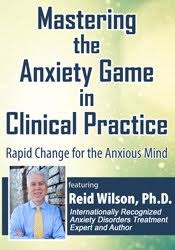Reid Wilson – Mastering the Anxiety Game in Clinical Practice, Rapid Change for the Anxious Mind
$200 Original price was: $200.$75Current price is: $75.
Shopping Instructions:
- DISCOUNT 15% : SHOP15
- Product Delivery: Within 1 – 12 hours after purchase.
When it comes to treating anxiety, growing evidence shows that the quickest, most effective approach involves ramping up fears while welcoming the experience.
Reid Wilson – Mastering the Anxiety Game in Clinical Practice, Rapid Change for the Anxious Mind
When it comes to treating anxiety, growing evidence shows that the quickest, most effective approach involves ramping up fears while welcoming the experience.
Join internationally recognized anxiety disorders treatment expert and author, Reid Wilson, PhD, for this cutting-edge seminar and start helping your clients stop the noise and change the way they relate to their anxieties.
You will learn how to rapidly engage anxious clients in the therapeutic alliance and then help them shift their relationship with their fears and override the responses that perpetuate them. You’ll explore paradoxical strategies to help clients transform their anxieties and worries from intimidating threats into challenges that they can meet and conquer. The goal is to persuade clients to adopt a self-help protocol to voluntarily, purposely and aggressively seek out uncertainty moment-by-moment
- Challenge the dominance of anxiety!
- Implement simple paradoxical strategies
- Teach clients to seek out anxiety and uncertainty
- Instruct a client in logically dismantling the common dysfunctional frames of reference of an anxiety disorder or OCD.
- Teach clients to implement a new, internally-consistent paradoxical frame of reference in order to alleviate symptoms of anxiety.
- Implement the “moment-by-moment” therapeutic strategy with clients who are exposed to threatening situations.
- Integrate both motivational and instructional self-talk cues to enhance exposure with clients.
- Articulate the clinical benefits of utilizing an arousal-congruent intervention to treat anxiety disorders.
- Appraise how to activate “approach” emotions toward anxious uncertainty during exposure.
Would you like to receive Reid Wilson – Mastering the Anxiety Game in Clinical Practice, Rapid Change for the Anxious Mind ?
Get Things Done Briefly
- The new data on rapid gain in treatment
- The Key: Promote change by transforming beliefs
- How to challenge resistance and the “getting rid of” pendulum problem
- Why provoking symptoms is better therapy than tolerating them
The Four Paradoxical Strategies
1. Step Back – Detachment and the Stepping Back Process
- Detach from the anxiety-provoking topic
- Change signals into noise
- Step back to gain perspective in the moment
- Generalized anxiety: “Maybe it’s this and not that”
2. Want It – Voluntarily Choosing the Experience
- Use the power of paradox to train the amygdala
- Use interoceptive exposure to modify beliefs
- Elevate a competing emotional attitude
- Choose awkward, clumsy, embarrassed, and insecure
3. Step Forward – Stepping Toward the Threat
- Move clients from defense to offence
- Persuade clients to provoke doubt and distress
- The “seeking out” strategy
- The “only do what you want to do” stance
4. Be Cunning – Talk to Anxiety
- The 3-step formula: Personify, Externalize, and Simplify
- Welcome doubt and distress through the front door
- The “act as though” principle
Doing the Work
- The logic and power of self-talk cues during performance
- Two forms of self-talk: Motivation & commands
- The benefits of moment-by-moment goals
- Generate and debriefing behavioral experiments
- Play with anxiety: How to score points
Related products
NLP & Hypnosis
NLP & Hypnosis
NLP & Hypnosis
NLP & Hypnosis
NLP & Hypnosis
NLP & Hypnosis
Joseph Cohen – The SelfHacked Secrets To Understanding Why You Are Sick And How To Get Well
NLP & Hypnosis












